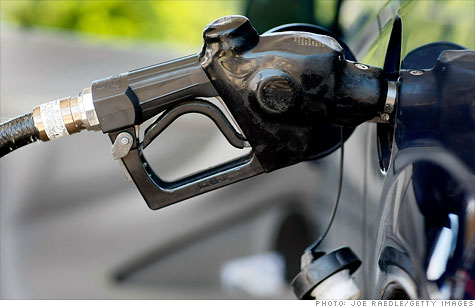Search News

Lawmakers may scrap the 18.4-cent-a-gallon federal levy when it expires next month. Can our roads really afford that?
NEW YORK (CNNMoney) -- You may want to consider investing in some good shock absorbers for your car this fall.
Fresh from blocking any new tax increases during the debt ceiling debacle, some lawmakers in Congress may now oppose renewing the federal tax on gasoline and diesel fuel, which is used to maintain our nation's highways.
The federal gas tax of 18.4 cents a gallon expires at the end of September. In order to keep the gas tax, lawmakers would need to vote to extend the highway funding bill, which is what the gas tax is tied to.
There are no official efforts to scrap the tax yet but as first noted in the journal Politco, momentum appears to be moving in that direction.
A bill was recently introduced by Senate Republicans that would allow states to opt out of the federal highway program. The highway program uses $32 billion each year collected by the gas tax, plus a handful of smaller fees and some borrowing to distribute some $50 billion a year to the states for road construction, maintenance and mass transit projects.
That represents about 28% of all road and transit spending nationwide, with the rest coming from states or towns in the form of tolls, registration and user fees, state gas taxes or their general funds.
Spendthrift motorists shouldn't get too excited by the prospect of eliminating the federal gas tax, which costs the average driver around $100 a year. The states would presumably make up for the loss of federal funds by increasing their own gas tax or other driving-related fees.
But for those who support ending the federal levy, the thinking is that the states could do a better job of building and maintaining the nation's infrastructure.
First there's the bureaucracy. Why collect the money at the state level, send it to Washington, only to have it return to the states?
Then there's the question of federal oversight. Federal money often requires the use of union labor or comes with other stipulations.
"The Davis-Bacon law increases the cost of new roads, bridges etc. by 25% to 33%," Grover Norquist, head of the advocacy group Americans for Tax Reform, said referring to the law that stipulates how much workers on federal projects need to be paid. "Much money is siphoned off to pay union workers in subway systems or to build bike paths....not roads."
About 15% of federal funds go toward mass transit and other things not road related, according to the Transportation Department.
Norquist didn't say if he'll use his considerable influence among Republicans to attempt to kill the gas tax next month, but did say "we should move now, or soon, to allow all states to raise and keep their own gas taxes to build and fix roads."
Supporters of the tax argue federal involvement allows roads to be built and maintained to uniform standards that ensure the smooth and safe flow of travel and commerce.
Having a patchwork of roads with different weight limits, lane widths, or curvature would be a headache for truckers and possibly dangerous for everyone, said Ken Orski, publisher of the infrastructure industry publication Innovation NewsBriefs and a former transportation official in the Nixon and Ford administrations.
Even if states had to build the roads to a federal standard, Washington still acts as as a kind of equalizer when it comes to highway funding. Under the federal system, states on the coasts with large populations often end up sending money to states in the middle of the country that have thousand of miles of open roads but fewer taxpayers to help fund them.
That makes sense, said Orski, as the roads in the middle of the country take a beating by heavy trucks shipping commerce from one coast to the other.
"We are one nation, and we need a national highway system," he said.
That helps explain why some big business groups not only want to keep the federal gas tax, but want it raised.
Both the Chamber of Commerce and General Motors (GM, Fortune 500) have recently come out in favor of a higher gas tax -- the latter arguing for a dollar-a-gallon increase.
They note that the 18.4 cent-a-gallon tax hasn't been raised since 1993, and now has the inflation-adjusted buying power of just 11 cents. Plus, fuel efficiency has been rising steadily each year along with miles driven, meaning Americans are putting more miles on roads while paying less to maintain them. ![]()
| Overnight Avg Rate | Latest | Change | Last Week |
|---|---|---|---|
| 30 yr fixed | 3.80% | 3.88% | |
| 15 yr fixed | 3.20% | 3.23% | |
| 5/1 ARM | 3.84% | 3.88% | |
| 30 yr refi | 3.82% | 3.93% | |
| 15 yr refi | 3.20% | 3.23% |
Today's featured rates:
| Latest Report | Next Update |
|---|---|
| Home prices | Aug 28 |
| Consumer confidence | Aug 28 |
| GDP | Aug 29 |
| Manufacturing (ISM) | Sept 4 |
| Jobs | Sept 7 |
| Inflation (CPI) | Sept 14 |
| Retail sales | Sept 14 |